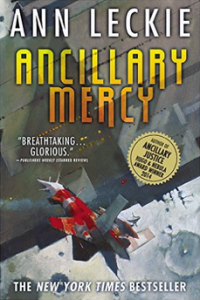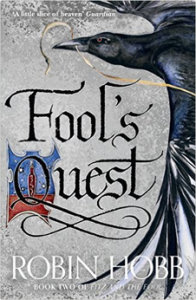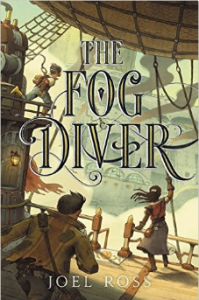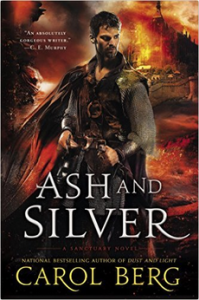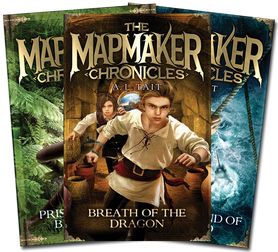S.K. Dunstall's Blog, page 35
January 23, 2016
World building. Literally.
 We’re going through a building boom here in Melbourne, Australia. Particularly in our little corner of suburbia, where the building regulations were recently changed, only months after a council heritage listing was overturned.
We’re going through a building boom here in Melbourne, Australia. Particularly in our little corner of suburbia, where the building regulations were recently changed, only months after a council heritage listing was overturned.
Now, instead of being a post-World War 2 streetscape of single-story houses on quarter acre blocks, we can build up to three houses on the block, and in our particular street we can build up to three storeys high. On streets nearby that goes up to six storeys.
As you can imagine, there are cranes popping up everywhere. Every time you walk around the neighbourhood it seems another yellow planning permit notice has gone up.
In the City of Melbourne itself—especially around the docklands—high-rise office buildings and apartment housing are going up at the same rate. Or being pulled down. [No parks or open spaces, sadly.  ]
]
In a recession, building stops almost altogether for a while. But there’s usually some building going on. Or demolition.
Which begs the question. Why aren’t science fiction and fantasy worlds full of building sites?
When a world is wealthy, it builds. When a world is undergoing expansion, it builds.
In space, we have some massive cities, but no-one’s building them. They’re always there, fully formed.
The rich live in modern, state-of-the-art multi-storey towers. The poor live in buildings that are condemned. But there’s not a building site in sight, and rarely a mention of one.
Thus, in the interests of adding reality, we added building construction to the world we created in Alliance (book two of Linesman).
Haladea III—formerly an agrarian world—has become the capital of the newly-formed New Alliance of governments. Seventy governments and their support staff have set up there, along with a combined military fleet.
They’re building. Boy are they building. The infrastructure is stretched. The richest woman on world is Trenery “We dispose of your disposals” King, who’s raking in the credits managing waste. New buildings are going up daily, old ones being torn down. The planet is one massive building site.
So we wrote it all in, even integrating some of the construction into the story.
When we’d finished we sent it off to our agent, to get her feedback.
She came back with:
“Too many mentions of all the construction on New Haladea. Cut by 50% or more.”
So we cut, and you’ll find she was right, because there’s still a lot of construction in the novel.
January 20, 2016
Do you want to win a copy of the Linesman audio book?
More book news, and timely, too, for last week I wrote about our involvement in creation of the audio book.
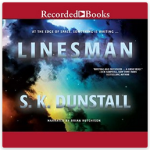 Linesman audio book
Linesman audio bookNow you can win a copy of the Linesman audio book. (If you’re in the US, anyway.)
Head over to GoodReads and put your name down. There are three copies to give away.
Look, it’s a book
Today we received an advance copy of Alliance.
 A book. A real book. It looks good.
A book. A real book. It looks good.The finished book. Did the page 99 test, opened it to a page, and started reading. (Except it wasn’t page 99, it was where the book opened naturally.)
It was good. Kept reading.
Very happy.
January 16, 2016
Creation of an audio book—from an author’s POV
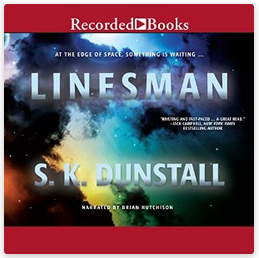 Linesman audio book
Linesman audio bookPaul, from Recorded Books, rang the other day, for the pronunciation list for the audio book version of Alliance.
23 February is coming up fast.
The creation of an audio book from the writer’s point-of-view
From our end, we have very little to do with creation of the audio book.
A month or two before the book is published, we get an email from Paul, with a list of words that they need to confirm pronunciation for. It’s mostly names.
Ean—pronounced as Ian
Galenos—Gall-en-os (short a, as in hat)
We agree on a time for him to call.
You might recall from earlier blogs that Sherylyn and I don’t always pronounce words the same way, so before that call we go through the list is agree how these particular words will be pronounced.
Paul calls us, and we talk through the list. It’s usually one of us on the phone, with the other close by.
I have to say, when you’re speaking directly to someone with a US accent, Australian pronunciation often comes across as broad and flat.
One day, when we have time, I’ll set up an audio file of the words we have to pronounce.
For Linesman, the audio came out on Audible when the book was published. The CD package came out in December 2015, so we are now the proud owner of a ten-set CD audible package of Linesman as well. All 12 hours and 41 minutes of it.
The actor’s point-of-view
 Brian Hutchison, the narrator for Linesman and Alliance. This image is from the IMDB Official Photos page ()
Brian Hutchison, the narrator for Linesman and Alliance. This image is from the IMDB Official Photos page ()The Linesman books are narrated by actor , who has done a lot of stage work, as well as appeared on television shows. He’s also a photographer.
We don’t know how Brian works, but Wil Wheaton talks about the process of recording audio for books and games in the first section of “This is why I support a SAG-AFTRA strike authorization for video games — and it isn’t about money“. Wil’s article is more about reading for games than it is about reading for books, but he describes it using the example of reading from a book.
We read our own books aloud, and we can do around ten pages before our voice starts to go. If we do it every day we do start to lose our voice. Reading a complete book aloud is hard work.
Another interesting take on recording the audio for a book is Katie Hafner’s The Unexpected Agony of Recording Your Own Audiobook.
Linesman has been well received in audio
The addition of the narrator adds an extra dimension to the story.
Probably the biggest surprise for us is how many people listened to the audio book. It’s larger proportion of total people who ‘read’ the book than we expected.
It has been well received, and review-wise, it’s rated well too.
January 9, 2016
Reading roundup 2015
This has been a big year in books for us, because our own first book, Linesman, was published this year. Our second (Alliance) was edited and will be out in February 2016; and we’ve almost finished writing the third. As a result, neither of us read as much as we’d like to, because we were writing.
Still, here are some of the stories we enjoyed, or that came to our attention, this year.
Favourite book
Even though we write together and enjoy many similar books, we don’t always have the same favourites. I (Karen) tend to enjoy the harder science fiction and ideas in the stories, while for Sherylyn it’s all about the character.
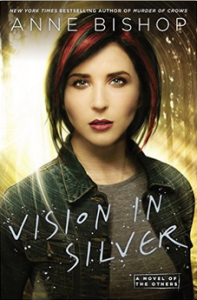 Sherylyn loved Anne Bishop’s Vision in Silver. She loves all of the books in The Others series, and is waiting impatiently for Marked in Flesh. I like The Others too, but so far I have only read Written in Red.
Sherylyn loved Anne Bishop’s Vision in Silver. She loves all of the books in The Others series, and is waiting impatiently for Marked in Flesh. I like The Others too, but so far I have only read Written in Red.
I don’t know that I had a favourite book this year. I was hanging out for Ann Leckie’s Ancillary Mercy. I only read it on the 31 December, and enjoyed it, but haven’t really decided if it was my best book of the year yet.
Sherylyn opts for Meg, from Vision in Silver. I like Translator Zeiat from Ancillary Mercy (although Sherylyn found her irritating). I was also quite partial to Captain, from Sorceror of the Wildeeps.
Best cover
Fool’s Quest, even though we haven’t read it, yet. We’ve got the Jackie Morris covers, and it’s fascinating to see the evolution from drawing to cover on Jackie’s site.
The Fog (nanobots) from Joel Ross’s The Fog Diver.
What can you say about thinking bots that deem humans as dangerous?
Book we want to read but neither of us have got to yet
Fool’s Quest, book two of Robin Hobb’s Fitz and the Fool series. This came out in August, and we’ve had it on the bookshelf ever since. We got it at a time when we were doing some heavy editing, so it kind of slipped our mind until now.
Other books we read and enjoyed
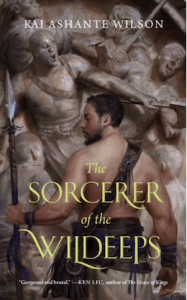 Sorceror of the Wildeeps, by Kai Ashanti Wilson.
Sorceror of the Wildeeps, by Kai Ashanti Wilson.
I loved the premise of this book. But the ending. No way. It’s the first book in a long time that I’ve flat out decided didn’t end the way the author implied it did. I so wanted to rewrite the end.
Ash and Silver, Carol Berg
A good follow-up to the first book, Dust and Light. Lucien had a bit more control of his life (sort of), which was nice.
The Mapmaker Chronicles, Alison Tait
I think we read all of these this year. It’s middle grade, about a race around the world, from the point-of-view of the mapmaker on one of the ships. Should appeal to anyone who enjoyed the John Flanagan Ranger’s Apprentice books.
Joel Ross’s The Fog Diver was another enjoyable book for the same age group.
Rachel Aaron Bach’s Paradox trilogy and her Nice Dragons books
We binge read through some of Rachel Aaron Bach’s books this year.
That was our reading. Or some of it, anyway. How was yours?
January 2, 2016
Reaching your limit for suspension of disbelief
 There’s a part in the new Star Wars movie (The Force Awakens) where the good guys are approaching the death star at close to light speed to avoid detection.
There’s a part in the new Star Wars movie (The Force Awakens) where the good guys are approaching the death star at close to light speed to avoid detection.
Just for a minute I flipped out of the movie, because in one second light can travel around the Earth seven and a half times. I had visions of the ship going round and round the planet in a loop, trying to slow down (undetected, of course), because you can’t stop in a second, no matter how hard you try. Not to mention, when the ship hits something (like trees or rocks), it’s going to hit hard.
The ship comes to a stop (just before a cliff) and I remembered that this is a Star Wars movie, and settled back to enjoy myself again.
Everyone has their own limits as to where they will suspend disbelief in science fiction. But when you hit that limit it can jolt you out of the story. Sometimes you can get back in, sometimes it ruins the story for you.
Take our novel, LINESMAN, in which humans discovered an alien spaceship five hundred years before the story starts. The ship has ‘lines’, bands of energy that allow the ship to jump into the void and come out somewhere else in the galaxy. Humans learned how to clone the lines, and have placed them on every human ship, giving them faster than light (FTL) travel.
Ship lines are maintained by ‘linesmen’, humans who have a special ability to sense the lines and can repair them.
No-one objects to the FTL component. Nowadays most readers of science fiction accept that to get anywhere in a reasonable amount of time we’ll need some form of hyperspace or warp drive. They don’t even object to some of our rather fast transfer times between shuttles and ships in space.
No, the sticking point for some people is that if it takes such specialist skills just to repair the lines, how is it possible that humans can build factories to clone them? We’ve had someone who couldn’t finish the story because they just couldn’t buy the way the lines were cloned.
Luckily for us, how the lines are reproduced isn’t an issue for most people.
It’s interesting how often what we deem less important facts take the reader out of the story, while the major story plot lines, no matter how improbable, don’t.
December 26, 2015
If your new Year’s resolution is to build a website
Opportune theft is everywhere
Somewhere in the Ukraine there’s a team of hackers who seem to spend all their time trying to break into our website. It feels like there is, anyway, because for months I’ve been banning Ukraine IPs from the site.
In reality, this Ukrainian hacker is probably a lone IT guy, with a single computer and a great algorithm, but boy do we get a lot of attempted logins from there. So many it sometimes feels like it’s big business to them.
There are other problem spots that pop up from time to time. One in China, one in India, one in Brazil, one in the US. But the Ukraine site (same city, different IPs) just keeps coming.
It’s funny, but until I installed a security program on our website I didn’t realise how often people tried to hack us.
New year’s resolutions
This time next week it will be 2016, and many of us will have made new year resolutions. One year mine was to set up a website.
This year, other people will have the same goal.
Websites (with blogs) are a tad old hat by now. Most people Facebook or Twitter or use one of the multitude of social media outlets out there. Me, I still love my blog best. It suits the way I work.
Enough people will start up their own blog to make this particular post useful. And if it stops a single person being hacked, well, I’ll be pleased to help.
So let’s say you’re someone like me—a writer—and you want to set up a blog or a website. What can you do to keep the opportune thieves out?
How do you discourage the hackers?
I’m not going to tell you how to protect your site totally, but here are a three simple tips to make it a harder to hack your system.
Tip 1: Strong password
The first one, and the most obvious, is to choose a strong password. Google ‘strong password’ on the internet and you’ll find out what a strong password is.
And yes, I know they can be hard to remember, but you can train yourself to remember them by turning off the ‘remember this password’ feature and typing in the password every day for a month. I guarantee it will stick eventually.
Tip 2: Don’t use ‘admin’ as a user name
Many programs give you a default login name of ‘admin’. Don’t use this. Choose something else. 90% of all attempts to hack into your website will do it by using ‘admin’ as the user. Don’t make it easy for them.
Tip 3: Don’t use the name that is displayed on your posts as the username
Your experienced hacker does try other names on occasion. Do you know which names they try? Those displayed on your blog posts. Thus, if you ensure the username doesn’t match the name displayed you’re making it a lot harder for them to log in.
It’s like burglary. You’ll never stop the determined thief with his lock picks and his bag of tools. But you can stop the opportune thieves—those who see the door open, or the handbag ready to snatch.
There are other things you can do, of course, but these three simple tricks will go a long way to help make your website secure.
Go for it
If your new year’s resolution is to build a website, then go for it. It’s a lot of fun.
December 24, 2015
Alliance – sample chapter
 It’s a peaceful Christmas for both of us. Enjoying it.
It’s a peaceful Christmas for both of us. Enjoying it.Merry Christmas.
This year has gone so fast. It’s hard to believe we’ve had one book published and the second is only two months away.
To celebrate, we’ve put up the first chapter of Alliance.
Enjoy.
December 19, 2015
Smart magpies
It’s 40 degrees Celsius outside and I’m trying to take a photo of the magpie outside the door. So far, all I’ve done is scare it away.
So no photo for this blog.
We lived in the country when we were kids. We rode our bikes everywhere. When we weren’t swimming in the creek, that was.
Spring added an extra hazard to any bike ride. Swooping magpies, protecting their nests. (I’m talking the Australian magpie here, which is a different species to the European magpie.)
If you’ve never been swooped by a magpie—it’s scary, and there’s nothing you can do about. Well, there is, but some of the commonly accepted methods—like putting eyes on the back of your bike helmet—don’t work.
Magpies are territorial, and we have magpies who live in our yard. They don’t swoop us. (I hope I haven’t jinxed us by writing this blog.) Their song is lovely in the morning. They’re also great mimics.
Anyway the magpies quickly learned that evaporative cooling is as good for them as it is for us. It doesn’t take them long to find the door we have open when we turn on the air conditioner. And that’s where they settle themselves, right in the breeze, for as long as we have the cooler on.
December 12, 2015
The LINESMAN that got us our agent is not the same LINESMAN that got published
Overheard at a literary function, one writer talking to another.
And now that I’ve sold it and the book’s doing well, you know what, I’m going to go back to that agent who passed and I’m going to say to them, “This is the book you passed on. Look how it’s doing now.”
The writer who was speaking took years to sell her book, but the published book was very successful, especially for a first novel. She and another writer were discussing a literary agent who’d passed on the book, saying something along the lines of, “I enjoyed this story, but I don’t think it will sell.”
So what’s wrong with the comment above? Other than that it’s bad form on the writer’s behalf.
Answer. The book that is doing well is most likely not the book the original agent passed on.
Let’s talk about our own experience. The LINESMAN that was doing the rounds trying to get us an agent was a vastly different book to the one that finally got published.
The agent who took us on, gave us feedback. Great feedback. Based on her feedback we re-wrote parts of the book. I can’t remember how many times it went back and forth before she was finally happy with it.
Then she started sending it out to editors. We saw some of the feedback.
“Ean is a fantastic character, but the second half of the book needs rework. I don’t think I’d have the time to work with the authors to fix it.”
It went around for twelve months like that. Our editor, Anne, who finally took it on, initially passed on it. She liked the story, but the second half didn’t work for her. But, she said, if we wanted to rework the second half, she’d take another look.
We rewrote the second half. It was a massive rewrite. Sent it back to our agent, who sent it to Anne, who finally accepted.
But the story changes didn’t stop there. We went through at least two more big rewrites with Anne.
By the time the story was ready for publication it was majorly different to the one that got us our agent. Sure, the basic story was the same—Ean was a linesman, the other linesmen thought he was crazy because he sang to the lines—but the rest of it was dramatically different.
It was also a much better book.
So in our experience, that agent the writer at the function was talking about was probably right to pass on the original book. It wasn’t right for her, and she didn’t love the book enough to help turn it into something she could sell.

